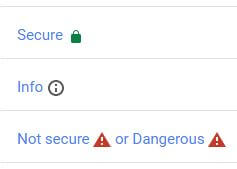In October 2016, during the CA/Browser Forum in Redmond, Washington, Google’s software engineer, Ryan Sleevi, introduced an imperative move by Google to mandate Certificate Transparency for Chrome web browsing.
Table of Contents:
1. Introduction
- A brief overview of Certificate Transparency and its importance for web security.
2. Understanding HTTPS and Digital Certificates
- An explanation of the core concepts of HTTPS and digital certificates.
- How HTTPS and SSL encryption play a vital role in securing web connections.
3. The HTTPS Indicator in Chrome
- A closer look at the secure browsing indicator displayed by Chrome when accessing websites.
- Understanding the various indicators and their significance.
4. Interpretation of HTTPS Indicators
- An explanation of the different indicators and what they signify to users:
- “Secure”: Encrypted and safe for transmitting data.
- “Info”: Not using a private connection, potential data exposure.
- “Not Secure or Dangerous”: A warning to avoid entering personal or sensitive information.
5. The Rationale Behind HTTPS
- A deeper exploration of HTTP (HyperText Transfer Protocol) and its secure variant, HTTPS (HyperText Transfer Protocol Secure).
- How digital certificates, when implemented, enable HTTPS and establish secure connections.
6. Chrome’s Transition to a “Not Secure” Web
- The timeline of Chrome’s gradual labeling of websites as “Not Secure,” commencing in January 2017.
- The impending full enforcement of the Certificate Transparency standard in October 2017.
7. SSL Certificates and Web Security
- A comprehensive explanation of the role of SSL certificates in securing sensitive information across global networks.
- The significance of SSL, even for websites that do not handle credit card data.
8. Demystifying Encryption
- An overview of encryption as a mathematical method to protect data from unauthorized access.
- The explanation of encryption key lengths, ranging from 40-bit to 256-bit, and their impact on security.
9. SSL Certificates in Shared Hosting
- The importance of installing SSL certificates on shared hosting platforms to ensure website security.
- Technical requirements for SSL certificate installation, including the need for a Dedicated IP address in shared hosting.
10. Provider Considerations
- A discussion on the necessity of confirming with hosting providers whether they support SSL certificates in shared hosting environments.
- The indispensable role of digital certificates in maintaining website security.

This report underlines the vital importance of SSL certificates, HTTPS, and Certificate Transparency in the context of Chrome web browsing. As Chrome’s stringent security measures become fully enforced, it is essential for website owners and hosting providers to embrace SSL certificates to safeguard data privacy and maintain user trust. Whether in shared hosting or other environments, SSL certificates are a cornerstone of online security and encryption, ensuring that web connections remain safe and private.


